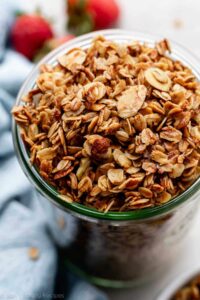Granola, a popular breakfast and snack food, has gained recognition for its versatility, convenience, and purported health benefits. However, its reputation as a weight loss-friendly food remains a topic of debate.
While granola is often perceived as a nutritious option due to its whole grain ingredients and inclusion of nuts and seeds, its calorie and sugar content can vary significantly depending on the ingredients and preparation methods.
In this essay, we will examine the relationship between granola and weight management, exploring its potential role in supporting weight loss and providing evidence-based insights into its impact on overall health.
Understanding the Nutritional Composition of Granola

Granola typically consists of rolled oats, nuts, seeds, dried fruit, sweeteners such as honey or maple syrup, and sometimes added fats such as oil or butter. While these ingredients offer various nutrients such as fiber, protein, healthy fats, and micronutrients, they also contribute to the calorie density of granola. Additionally, some commercially available granola products may contain added sugars, artificial flavors, and preservatives, which can detract from their overall nutritional quality.
The Role of Granola in Weight Management
- Satiety and Portion Control: Granola’s combination of fiber, protein, and healthy fats can promote feelings of satiety and fullness, which may help prevent overeating and support portion control. Including moderate portions of granola in meals or snacks can help curb hunger and reduce the risk of consuming excess calories throughout the day.
- Energy Density: Despite its nutrient-rich ingredients, granola can be calorie-dense, meaning it provides a significant amount of calories in a relatively small serving size. Consuming large portions of granola without considering portion size or overall calorie intake can contribute to weight gain or hinder weight loss efforts. Therefore, moderation and mindful eating are key when incorporating granola into a weight management plan.
- Nutrient Density: While granola can be calorically dense, it also offers essential nutrients such as fiber, vitamins, minerals, and antioxidants. Choosing granola varieties with minimal added sugars, whole grain oats, and nutrient-rich ingredients like nuts, seeds, and dried fruit can enhance its nutritional profile and contribute to overall health and well-being.
Evidence-Based Insights
Several studies have investigated the effects of granola consumption on weight management and metabolic health. While research findings are mixed, some studies suggest that including moderate amounts of granola as part of a balanced diet may support weight loss and improve markers of metabolic health. For example:
- A study published in the Journal of Nutrition and Metabolism found that consuming whole-grain oats, a primary ingredient in granola, was associated with greater feelings of fullness and reduced hunger compared to refined-grain breakfast cereals. Participants who consumed whole grain oats also had lower energy intake at subsequent meals, suggesting that incorporating oats into the diet may help control appetite and support weight management.
- Another study published in Nutrients examined the effects of a nut-enriched granola cereal on satiety and metabolic outcomes in overweight and obese individuals. The researchers found that participants who consumed the nut-enriched granola experienced greater feelings of fullness and reduced hunger compared to those who consumed a control cereal. Additionally, participants who consumed the nut-enriched granola had improvements in markers of glucose metabolism and insulin sensitivity, indicating potential benefits for metabolic health.
Practical Tips for Incorporating Granola into a Weight Management Plan
- Read Labels Carefully: When selecting granola products, read the nutrition labels carefully to assess the calorie, sugar, and nutrient content per serving. Choose granola varieties with minimal added sugars, whole grain oats, and nutrient-rich ingredients like nuts, seeds, and dried fruit.
- Watch Portion Sizes: Be mindful of portion sizes when serving granola. Stick to recommended serving sizes to avoid consuming excess calories and maintain portion control. Consider measuring out portions using measuring cups or a food scale to ensure accuracy.
- Balance with Other Foods: Incorporate granola into balanced meals or snacks alongside other nutrient-rich foods such as Greek yogurt, fresh fruit, and vegetables. Pairing granola with protein-rich foods can help enhance satiety and provide a more balanced nutrient profile.
- Limit Added Sugars: Choose granola products with minimal added sugars or opt for unsweetened varieties. Alternatively, make homemade granola using natural sweeteners like honey or maple syrup in moderation.
- Be Mindful of Toppings: Be cautious when adding toppings such as honey, dried fruit, or chocolate chips to granola, as these can contribute additional calories and sugar. Use toppings sparingly or opt for lower-calorie alternatives to keep calorie intake in check.
Conclusion
Granola can be a nutritious and satisfying addition to a weight management plan when consumed in moderation and as part of a balanced diet. While granola offers essential nutrients such as fiber, protein, and healthy fats, its calorie density and potential for added sugars warrant careful consideration when incorporating it into meals or snacks.
By selecting granola varieties with minimal added sugars, watching portion sizes, and balancing with other nutrient-rich foods, individuals can enjoy the benefits of granola while supporting their weight loss goals and overall health. As with any dietary component, moderation, variety, and mindful eating practices are key to achieving and maintaining a healthy weight and lifestyle.
Related Tags
Taiwo Olawuyi
Taiwo Olawuyi is a highly dedicated and passionate professional blogger, renowned for her ability to create captivating, informative, and engaging content in the realm of health and wellness. She holds a Bachelor's degree in Political Science from Olabisi Onabanjo University and a Master's degree in Adult Education from the prestigious University of Ibadan. Her profound passion for health and wellness, coupled with her unwavering dedication to her audience, serves as a constant source of inspiration and enlightenment for readers worldwide.










